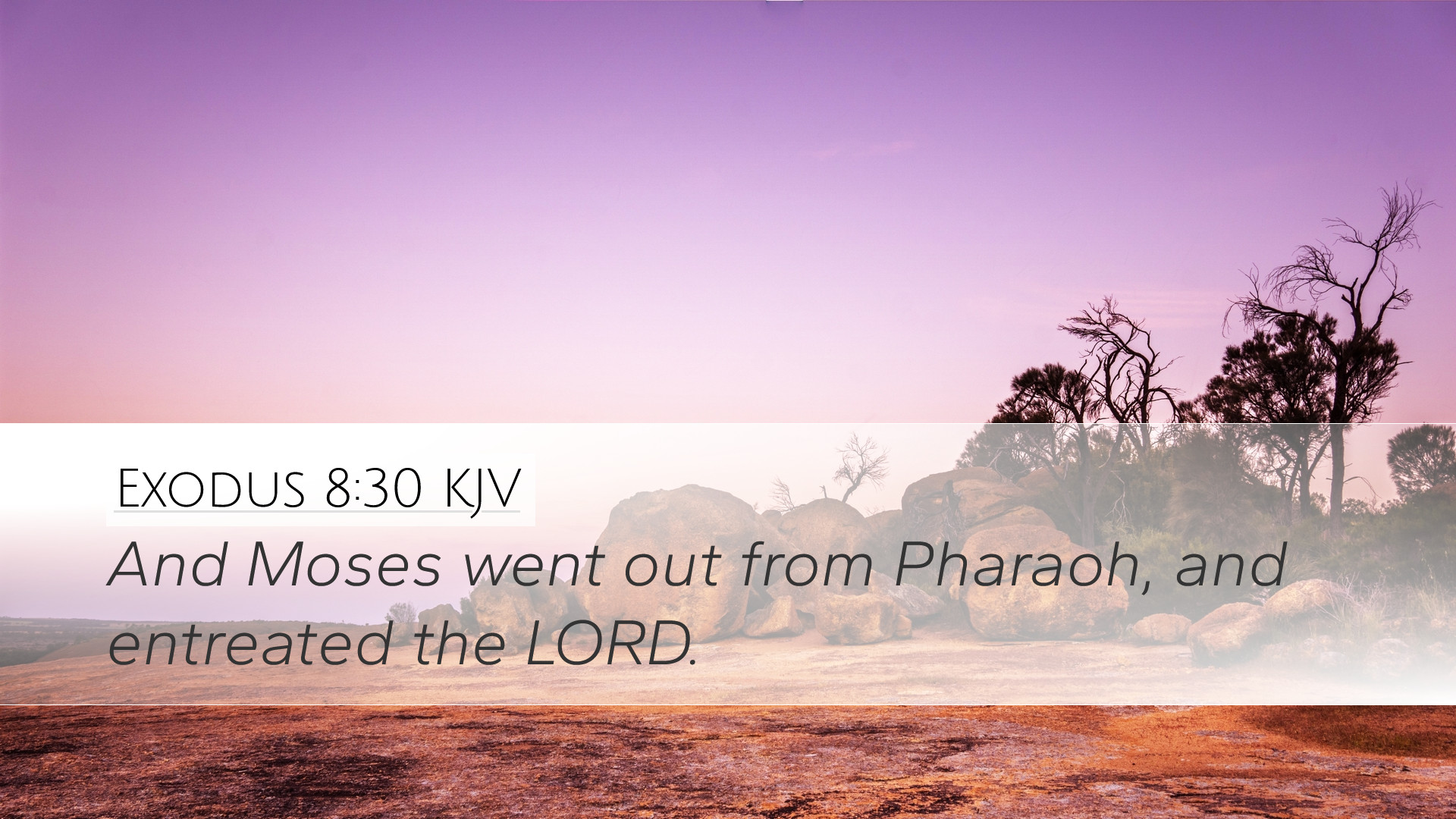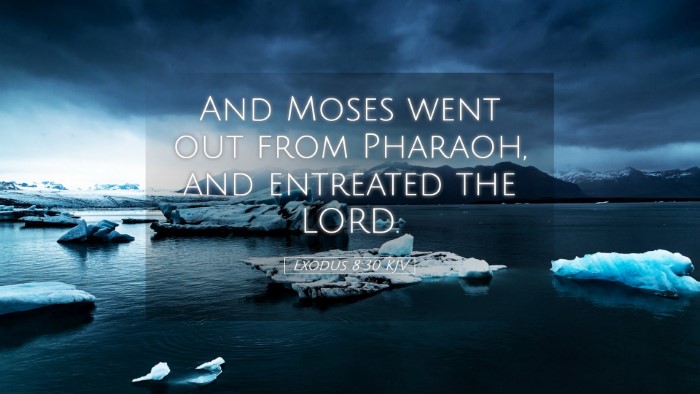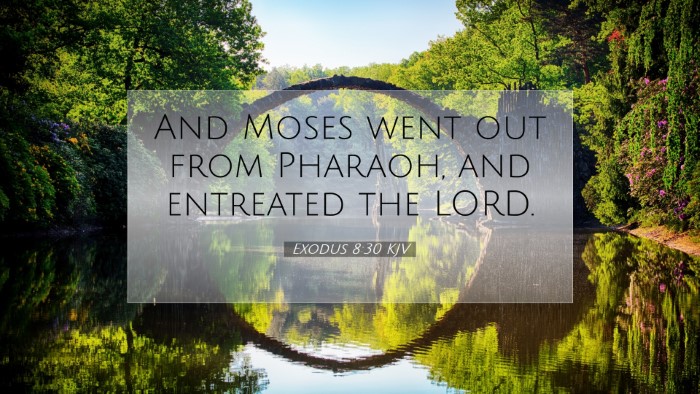Commentary on Exodus 8:30
Verse: Exodus 8:30 - "And Moses went out from Pharaoh, and entreated the LORD."
Introduction
This verse marks a significant moment in the confrontation between Moses, the representative of God, and Pharaoh, the ruler of Egypt. The context surrounding this verse involves the aftermath of the plagues that God has sent upon Egypt to compel Pharaoh to release the Israelites from bondage. This commentary seeks to explore the theological, practical, and historical implications of this verse by integrating insights from public domain commentaries, particularly those of Matthew Henry, Albert Barnes, and Adam Clarke.
The Context of the Plague
Exodus 8 details the plague of frogs, which was one of the many plagues inflicted upon Egypt due to Pharaoh's hardened heart. It illustrates the struggle between divine authority and human obstinacy. As Henry notes, the plagues serve not only as judgments against Egypt but also as signs of Israel's future deliverance. This highlights the dual purpose of affliction and liberation inherent in God's actions.
Moses' Intercession
The phrase "Moses went out from Pharaoh, and entreated the LORD" signifies an important transition. Upon leaving Pharaoh’s presence, Moses does not act out of frustration but rather seeks divine intervention. Barnes elaborates on this concept by indicating that Moses exemplifies the role of a mediator, interceding on behalf of both the Israelites and even Pharaoh himself. This reveals a profound lesson in leadership and the pursuit of justice through prayer.
Mediation and Advocacy
Moses' actions remind us that effective leadership is attentive to the needs of others, seeking God’s guidance through prayer. Clarke emphasizes that true advocacy involves seeking to align oneself with God’s will, rather than merely pursuing personal ambitions. This interchange illustrates the necessity of divine consultation in moments of national crisis. Leaders are called to respond not solely with authority but in humble reliance on God's power.
The Response to Adversity
Exodus 8:30 encapsulates a pivotal lesson about responding to adversity. As Pharaoh continues in his rebellion against God, Moses’ faithful engagement with him reflects the grace found in intercessory prayer. According to Henry, this act of 'entreating the LORD' denotes both supplication and a sense of urgency. It suggests that in times of spiritual and moral conflict, it is imperative to turn towards God for wisdom and strength.
The Importance of Prayer
Moses’ prayer serves as a reminder of the importance of seeking divine help amid trials. The act of entreating the LORD is a covenantal reflection of reliance on God's character and promises. Barnes discusses how prayer is often the believer's first response—not a last resort—demonstrating that in distress, a connection with God is paramount. Pastoral leaders are encouraged to model this behavior, guiding congregations towards a deeper reliance on prayer during challenging times.
Theological Implications
This brief verse highlights several theological themes, including the sovereignty of God, the role of humanity in divine plans, and the importance of faithfulness in leadership. Clarke notes that Moses’ action can be seen as a demonstration of God's mercy; even in the face of Pharaoh's obstinacy, God is willing to intervene on behalf of His people. This illustrates God's control over history and His active involvement in the lives of individuals and nations.
The Hardening of Pharaoh's Heart
Throughout Exodus, the recurring motif of the hardening of Pharaoh's heart serves to underscore the tension between human agency and divine sovereignty. Pharaoh's refusal to listen illustrates the danger of persistent disobedience. Henry underscores that God’s judgments serve to not only compel obedience but also to reveal His glory, ultimately culminating in Israel’s liberation. The narrative calls the faithful to reflect on their own tendencies toward hardness of heart and to seek God's transformative power through prayer.
Practical Applications
The implications for contemporary believers, including pastors, students, and theologians, are significant. This passage encourages leaders to embody the qualities of intercessory prayer, long-suffering, and humility in their ministry. The faithful pursuit of God through prayer can catalyze both personal and communal transformation.
- Leadership through Prayer: This passage reinforces the necessity for leaders to prioritize prayer as a foundational aspect of their ministry, aligning their leadership with God’s purposes.
- Awareness of Spiritual Warfare: Understanding that interactions with the world may often be steeped in spiritual conflict, as with Moses and Pharaoh, encourages discernment in addressing issues facing the church and society.
- Recognizing the Human Condition: Moses' plea serves as a reminder of the shared human need for divine mercy and guidance, fostering an empathetic approach towards the struggles of others.
Conclusion
Exodus 8:30 invites readers to contemplate the interplay between obedience to God, the call to prayer, and the complexities of human relationships with authority. By examining Moses’ response to Pharaoh and his commitment to intercession, believers are urged to engage actively in prayer, recognize their role as mediators, and approach adversities with a disposition of hope rooted in God’s sovereignty. The historical and spiritual lessons contained within this passage remain relevant today, serving as a call to humility, prayerfulness, and faithful leadership amidst the trials of life.


